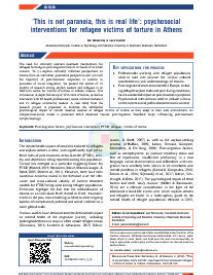‘This is not paranoia, this is real life’ : psychosocial interventions for refugee victims of torture in Athens
The need for culturally relevant treatment interventions for refugees focusing on post-migration factors is clearly of no small concern. To (i) explore culturally informed perspectives on trauma from an individual, qualitative perspective and (ii) track the trajectory of post-traumatic responses in relation to processes of social integration, we present the results of 12 months of research among asylum seekers and refugees in an NGO-run centre for victims of torture in Athens, Greece. This included an in-depth follow-up of 10 victims of torture, as well as interviews with 36 health professionals, seven cultural mediators and 21 refugee community leaders.
A case study from the research project is presented to illustrate the substantial psychological impact of current material realities of refugee victims of torture as they adapt to their new environment. An interpersonal-social model is presented which examines various post-migration ‘feedback loops’ influencing post-traumatic symptomatology.
Key implications for practice
- Professionals working with refugee populations need to take into account the various cultural manifestations and understandings of trauma
- Post-migration factors encountered in Europe, including delayed asylum trials and poor living conditions, have a substantial impact on post-traumatic symptoms
- Psychosocial interventions need to include a focus on the current social, political and economic context.
In: Intervention: Journal of Mental Health and Psychosocial Support in Conflict Affected Areas, ISSN 1571-8883 | 16 | 2 | 95-102
http://doi.org/10.4103/INTV.INTV_5_18


